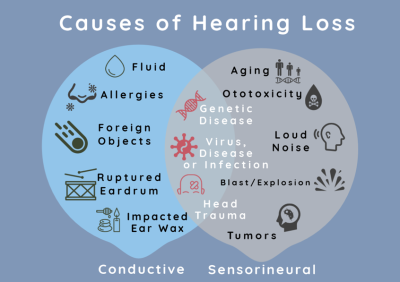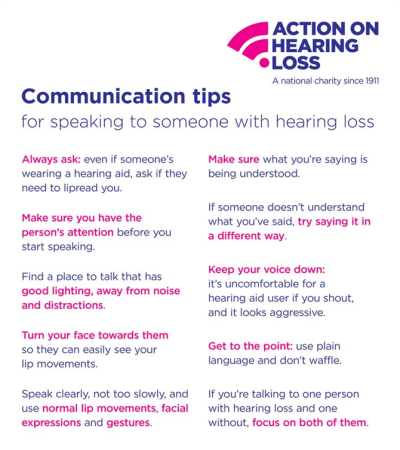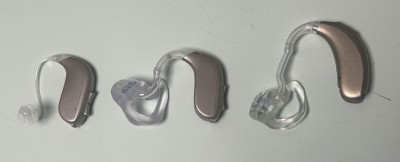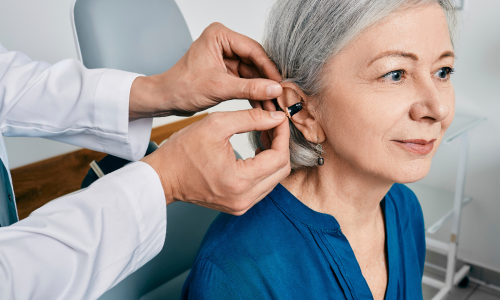
Causes of Hearing Loss
Conductive
- Fluid
- Allergies
- Foreign Objects
- Ruptured eardrum
- Impacted ear wax
Sensorineual
- Aging
- Ototoxicity
- Loud noise
- Blast/explosion
- Tumour
Combination
- Genetic Disease
- Head trauma
- Virus, disease or infection
Our Audiology teams are here to help people with hearing difficulties and Tinnitus. The team consists of Audiologists, Assistant Audiologists and Administrators, and we liaise closely with Ear, Nose and Throat (ENT) consultants and other professionals.
The Audiology Department is a recognised training centre for Aston University in Birmingham and usually has a placement for students who want to gain valuable clinical experience to qualify as an Audiologist.
We are delighted to have been recognised for the commitment we have to each of our patients.
We have the ‘Inspired by IDA’ benchmark and our department was the first nationally to be accredited as IDA approved, labelled for high-quality, personalised hearing care.
The label is issued to hearing specialists who have completed courses in person-centred counselling from the IDA Institute in Denmark. Clinics can obtain the label if 80% of the staff have completed the courses. The label allows you to identify hearing specialists who are committed to providing you with personalised care and advice on how to manage hearing loss in daily life.
What is Person-Centred Care?
Person-centred care is a way of seeing people and their families as experts in their own experience of hearing loss, working alongside the health care provider to determine which solutions and strategies will help those most.
What to expect
A person-centred hearing care professional will:
- Talk to you about your individual needs and preferences.
- Invite your spouse or other close relatives to join sessions.
- Work with you to establish a treatment plan based on your personal lifestyle.
- Provide you with advice on managing hearing difficulties in daily life.

Audiology is a major support service to ENT but also operates independently accepting GP referrals for many of its services.
- For new patients over the age of 55 who are seeking support with their hearing problems and have no active ear disease, please ask your GP to refer you directly to the Audiology Department.
If you are a patient with additional ear problems who is seeking support with their hearing problems (and have not previously seen an Ear Nose & Throat doctor before) or you are under the age of 55, please ask your GP to refer you to ENT. Some examples of ear problems are:
- Sudden hearing loss – within 72 hours (this is counted as a medical emergency so please seek support from either your GP or A+E as soon as possible)
- Rapid onset of hearing loss (90 days or less)
- Fluctuating hearing loss which is not associated with having a cold
- Asymmetrical hearing loss (where one ear seems worse than the other)
- Regular ear infections/discharge from your ears (which is not wax) or regular pain
- A perforated eardrum or other issues with your outer ear can be seen when your doctor examines your ear
- Tinnitus where you have it only in one ear, it beats in time with your pulse, it is affecting your quality of life and sleep disturbance
- Sound sensitivity (Hyperacusis)
- Vertigo (Dizziness)
For patients who require a hearing test only (even if you are under the age of 55) your GP is able to refer you directly to Audiology if you are over the age of 18 years, but if you require a hearing aid other than another intervention then your GP will need to refer you through ENT to access this service.
We also run a Specialist Hearing Clinic for adults with complex hearing losses or co-existing conditions and your GP can refer you to be seen on this clinic.
For all referrals, your ears should be completely clear of wax prior to attending your appointment, in order to complete all of the testing and procedures required. Please see your GP for advice on wax removal.
We are no longer running the Open Repair drop in clinic at Warwick hospital. If you have any problems with your hearing aids or require a service, there a few options you can consider:
- Drop off & Collection service – You can drop your hearing aid off at Audiology reception and an Audiologist will repair/service your hearing aids. The Audiologist will call you when your hearing aids are ready to be collected or we can post them back to you.
- Postal Repair – If you cannot attend the Audiology department, you can post your hearing aids to us via Special Delivery and we will post them back to you via Special Delivery, once the aids have been repaired.
- Booked Repair – You can call us and arrange a face to face appointment
- Batteries and spare tubing - you can contact us to request these using the methods below.
Postal repairs should be sent to:
Audiology Department
Warwick Hospital
Lakin Road
CV34 5BW
Please contact us on audiology.
Your initial assessment will be with a member of the Audiology team and will last up to an hour.
During this appointment we will:
- Talk to you about your hearing problems and the impact it is having on your quality of life.
- Go through some medical questions.
- Complete some diagnostic hearing tests.
Based on the results we will go over your treatment options with you. Treatment options may include managing without technology, the use of communication tactics, the use of assistive listening devices, the fitting of hearing aids or an onward referral. There are benefits and limitations of each treatment option and the Audiologist will discuss these with you allowing you to make a decision on your treatment.
At the end of your appointment, you will be given a leaflet about what has been agreed with you.
The Audiologist will go through a thorough examination using the most appropriate tests and procedures to support you. If you would like to know more about the range of tests we can undertake please see the leaflet: Tests and Procedures.
We are currently using a wide range of behind-the-ear hearing aids from different manufacturers, including Oticon and Phonak. We will offer you the most appropriate hearing aid(s) for your hearing loss from our selection. (Please note that in-the-ear hearing aids are not routinely available).

You will be given an instruction leaflet for your hearing aid. The model or type of hearing aid you have can be found by looking at the underside of the hearing aid. If you mislay your leaflet and would like a replacement please ask the audiologist at the next appointment you have.
It’s not unusual to find that it takes a while to get used to your new hearing aid, therefore sounds may seem louder, tinny and echoing but you will get used to this by wearing the hearing aids for prolonged use of time. They can’t give you perfect hearing, but they should help you to hear speech and everyday sounds better, such as speech, Television, doorbell etc. Wearing hearing aids should never make sounds uncomfortably loud or make your hearing worse and if you experience this then please come back to see us.
Most hearing aids are also designed to reduce certain kinds of background noise but they do not eliminate the noise completely and so using other clues (such as lip-reading) can help.
Another useful resource is a range of videos which can provide you with information about your hearing aids. These have been developed by the National Institute of Health Research and cover the following areas:
- Getting to know you hearing aids
- How to insert your hearing aids
- What to expect when wearing hearing aids
- Adapting to wearing hearing aids
- Communication tactics
- Using the phone and other devices
- Hearing aid care and troubleshooting
Access each of these videos: C2Hear - Advice on hearing aids and communication that has been developed by hearing aid users and audiologists.
Please click here for more information on Tinnitus and Hyperacusis.
Please click on the links below to access the different sessions in the virtual Tinnitus Information Programme:
Introduction
Part 1 - Frequently asked questions
Part 2 - How the brain processes and interprets sound
Part 3 - Things that make Tinnitus worse
Part 4 - Management options
Click here to view a series of videos on the SWFT Youtube page.
The Warwick Tinnitus Support Group is led by the Tinnitus Team at Warwick Hospital. We welcome all people with tinnitus to join our friendly meetings whether or not they are seen at Warwick Hospital. You are welcome to bring a friend or relative with you.
The next meeting will be:
Wednesday 18th March 2026 1.30-3.15pm at St Mary Immaculate Church Hall, 45 West Street, Warwick, CV34 6AB.
Tel: +44 (0)1926 482668
Email: Audiology.
Audiology Department, South Warwickshire University NHS Foundation Trust, Lakin Road, Warwick, CV34 5BW.
Please note: After 16:30pm on Fridays, there are no administrators available and therefore if you leave a voice mail, your enquiry will not be received.
How to find The Audiology Department
Warwick Hospital
Please enter the outpatients department and walk straight towards the main reception. Proceed straight ahead following the orange stickers on the floor. Turn right in to the green waiting area and follow the orange stickers to the left to Audiology reception.
Please be aware that the car park at Warwick Hospital can get very busy. Please allow plenty of time for parking, if you are over 10-15 minutes late for your appointment we may have to rearrange it for another day.
Stratford Hospital
If you park in the multi-storey car park please leave through the pedestrian exit and turn to your left. You will see the Outpatients department straight ahead of you. Once there go through the automatic doors and you will find the main reception on your right-hand side. Please let them know you have arrived for your appointment. The Audiology room is straight ahead of you signed as ‘Hearing Services. Please take a seat in the waiting room and wait for the Audiologist to call you.


